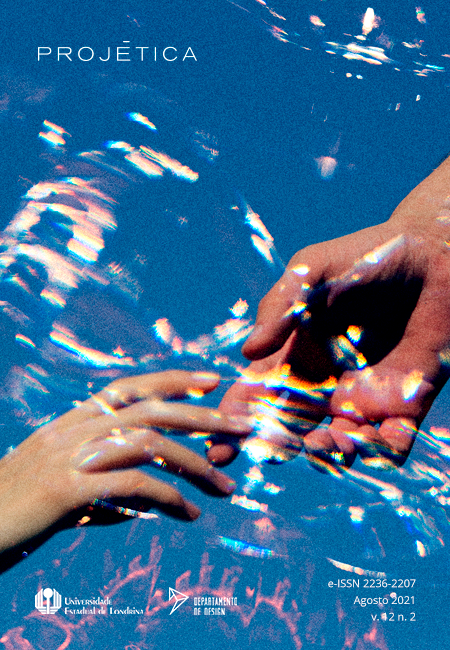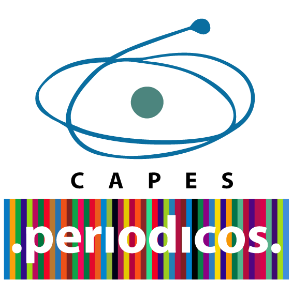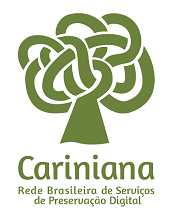Behaviour and emotion for sustainable product design: a review
DOI:
https://doi.org/10.5433/2236-2207.2021v12n2p70Palavras-chave:
Design for Sustainable Behaviour, Product Design, User Concerns, Emotional DesignResumo
Design for Sustainable Behavior focuses on how products can be designed so that users behave in a more sustainable way. User behavior is also associated with emotional interaction with products. This article aims to identify, through a systematic review of the literature, the scope of research addressing user behavior in the development of products for sustainability and the approach of emotion in this context. Also, what aspects of sustainability and types of products are lacking in the scope of research.Downloads
Referências
APOSTOLOU, Georgia; REINDERS, Angele H. M. E. Overview of Design Issues in Product-Integrated Photovoltaics. Energy Technology, Stockholm, v. 2, n. 3, p. 229-242, Mar. 2014.
APOSTOLOU, Georgia; REINDERS, Angele. How do users interact with photovoltaic-powered products? Investigating 100 'lead-users' and 6 PV products. Journal of Design Research, [s. l.], v. 14, n. 1, p. 66-93, 2016.
BAO, Qifang et al. Investigating user emotional responses to eco-feedback designs. Journal of Mechanical Design, New York, v. 141, n. 2, p. 1-16, 2019.
BHAMRA, Tracy; LILLEY, Debra.;TANG, Tang . Design for Sustainable Behaviour: Using products to change consumer behaviour. Design Journal, [s. l.], v. 14, n. 4, p. 427-445, Dec. 2011.
BOCKEN, Nancy M. P. et al. Pay-per-use business models as a driver for sustainable consumption: Evidence from the case of HOMIE. Journal of Cleaner Production, Amsterdam, v. 198, p. 498-510, Oct. 2018.
BOON, Boudewijn; WEVER, Renee.;QUIST, Jaco. Beyond behaviour change: technological artefacts and characterological development. International Journal of Sustainable Engineering, Milton Park, v. 8, n. 3, p. 231-247, 2015.
BRIDGENS, Ben et al. Closing the Loop on E-waste: A Multidisciplinary Perspective. Journal of Industrial Ecology, [s. l.], v. 23, n. 1, p. 169-181, 2019.
CESCHIN, Fabrizio; GAZIULUSOY, Idil. Evolution of design for sustainability: From product design to design for system innovations and transitions. Design Studies, Oxford, v. 47, p. 118-163, Nov. 2016.
CHENG, Yueh-Te; SHIH, Li-Hsing; HA, Jack. Design framework of household appliance for users' sustainable behaviors. Anthropologist, New Delhi, v. 17, n. 3,p. 701-711, 2014.
CHOI, Yoon Jung; STEVENS, John; BRASS, Clare. Carative factors in the design development process: towards understanding owner-object detachment and promoting object longevity. Design Journal, [s. l.], v. 21, n. 4, p. 477-497, 2018.
COR, Emmanuelle; ZWOLINSKI, Peggy. A Protocol to address user behavior in the eco-design of consumer products. Journal of Mechanical Design, New York, v. 137, n. 7, p. 071413, July 2015.
COSKUN, Ayku; ZIMMERMAN, John; ERBUG, Cigdem. Promoting sustainability through behavior change: A review. Design Studies, Oxford, v. 41, pt B, p. 183-204, Nov. 2015.
DAAE, Johannes Zachrisson; BOKS, Casper. Dimensions of behaviour change. Journal of Design Research, [s. l.], v. 12, n. 3, p. 145-172, Aug. 2014.
DAAE, Johannes Zachrisson; BOKS, Casper. A classification of user research methods for design for sustainable behaviour. Journal of Cleaner Production, Amsterdam, v. 106, p. 680-689, Nov. 2015a.
DAAE, Johannes Zachrisson; BOKS, Casper. Opportunities and challenges for addressing variations in the use phase with LCA and Design for Sustainable Behaviour. International Journal of Sustainable Engineering, [s. l.], v. 8, n. 3, p. 148-162, 2015b.
DAAE, Johannes Zachrisson et al. Burning for sustainable behaviour. Journal of Design Research, [s. l.], v. 14, n. 1, p. 42-65, 2016.
DAAE, Johannes Zachrisson; CHAMBERLIN, Lucy; BOKS, Casper. Dimensions of Behaviour Change in the context of Designing for a Circular Economy. Design Journal, [s. l.], v. 21, n. 4, p. 521-541, 2018.
DAMÁSIO, Antonio. O mistério da consciência: do corpo e das emoções ao conhecimento de si. São Paulo: Companhia das Letras, 2000.
DEMIR, Erdem; DESMET, Pieter MA; HEKKERT, Paul. Appraisal patterns of emotions in human-product interaction. International Journal of Design, Paris, v. 3, n. 2, p. 41-51, 2009.
DESMET, Pieter; HEKKERT, Paul. Framework of product experience. International Journal of Design, Paris, v. 1, n. 1, p. 57-66, 2007.
Di SORRENTINO, Eugenia Polizzi; WOELBERT, Eva; SALA, Serenella. Consumers and their behavior: state of the art in behavioral science supporting use phase modeling in LCA and ecodesign. International Journal of Life Cycle Assessment, [s. l.], v. 21, n. 2, p. 237-251, 2016.
GEELEN, Daphne; REINDERS, Angele; KEYSON, David. Empowering the enduser in smart grids: Recommendations for the design of products and services. Energy Policy, Guildford, v. 61, p. 151-161, Oct. 2013.
HARATTY, Marcus; BHAMRA, Tracy; MITCHELL, Val. Digital design for sustainable behaviour: a conceptual framework to guide design intervention. In: PROCEEDINGS OF BCS HCI 2012 WORKSHOPS USING TECHNOLOGY TO FACILITATE BEHAVIOUR CHANGE AND SUPPORT HEALTHY, SUSTAINABLE LIVING, 2012, [s. l.]. Proceedings [...]. [S. l.: s. n.], 2012. Disponível em: https://bit.ly/3nf7q4z. Acesso em: 02 jul. 2020.
HEKKERT, P.; Tromp, N; e Verbeek. Design for Socially Responsible Behavior: A classification of Influence Based on Intended User Experience. In design Issues: volume 27, number 3. Chicago: Massachusetts Institute of Technology, 2011
KREMER, Joelma. Caminhando rumo ao consumo sustentável: uma investigação sobre a teoria declarada e as práticas das empresas no Brasil e no Reino Unido. PPG em Ciências Sociais. 2007. Tese (Doutorado em Ciências Sociais) - Pontifícia Universidade Católica de São Paulo, São Paulo, 2007.
KUO, Tsai Chi et al. Identifying sustainable behavior of energy consumers as a driver of design solutions: The missing link in eco-design. Journal of Cleaner Production, Amsterdam, v. 192, p. 486-495, Aug. 2018.
KUO, Tsai; SMITH, Shana. A systematic review of technologies involving eco-innovation for enterprises moving towards sustainability. Journal of Cleaner Production, Amsterdam, v. 192, p. 207-220, Aug. 2018.
LAITALA, Kirsi; BOKS, Casper. Sustainable clothing design: use matters. Journal of Design Research, [s. l.], v. 10, n. 1-2, p. 121-139, 2012.
LAITALA, Kirsi; KLEPP, Iingun G.; BOKS, Casper. Changing laundry habits in Norway. International Journal of Consumer Studies, [s. l.], v. 36, n. 2, p. 228-237, 2012.
LILLEY, Debra. Designing for behavioural change: reducing the social impacts of product use through design. 2007. Thesis. (Doctor of Philosophy) - Loughborough University, Loughborough, 2007.
LILLEY, Debra. Design for sustainable behaviour: strategies and perceptions. Design Studies, Oxford, v. 30, n. 6, p. 704-720, 2009.
LILLEY, Debra; WILSON, Garrath T. Integrating ethics into design for sustainable behaviour. Journal of Design Research, [s. l.], v. 11, n. 3, p. 278- 299, 2013.
LÖBACH, Bernd. Design Industrial: bases para a configuração dos produtos industriais. São Paulo: Blücher, 2001.
LOCKTON, Dan et al. Exploring problem-framing through behavioural heuristics. International Journal of Design, Paris, v. 7, n. 1, p. 37-53, 2013.
LOCKTON, Dan; HARRISON, David; STANTON, Neville A. Exploring design patterns for sustainable behaviour. Design Journal, [s. l.], v. 16, n. 4, p. 431- 459, 2013.
LOCKTON, Dan; HARRISON, David; STANTON, Neville A. Making the user more efficient: Design for sustainable behaviour. International Journal of Sustainable Engineering, [s. l.], v. 1, n. 1, p. 3-8, 2008.
LOCKTON, Dan; HARRISON, David; STANTON, Neville A. Models of the user: designers' perspectives on influencing sustainable behaviour. Journal of Design Research, [s. l.], v. 10, n. 1-2, p. 7-27, 2012.
MACDONALD, Erin; SHE, Jinjuan. Seven cognitive concepts for successful ecodesign. Journal of Cleaner Production, Amsterdam, v. 92, p. 23-36, 2015.
MAGAREY, Judy M. Elements of a systematic review. International Journal of Nursing Practice, [s. l.], v. 7, n. 6, p. 376-382, Dec. 2001.
MARSHHADI, Ardeshir Raihanian; BEHDAD, Sara. Discriminant effects of consumer electronics use-phase attributes on household energy prediction. Energy Policy, Guildford, 118, pp. 346-355, 2018.
MEDEIROS, Janine Fleith de; ROCHA, Cecília Gravina da; RIBEIRO, José Luis Duarte. Design for sustainable behavior (DfSB): analysis of existing frameworks of behavior change strategies, experts' assessment and proposal for a decision support diagram. Journal of Cleaner Production, Amsterdam, v. 188, p. 402-415, July 2018.
MORENO, Mariale et al. A conceptual framework for circular design. Sustainability, [s. l.], v. 8, n. 9, p. 1-15, 2016.
MORENO, Mariale A.; LOFTHOUSE, Vicky A.; LILLEY, Debra. Enabling sustainable consumption through user-centered design: an approach. Design Principles and Practices, [s. l.], v. 5, n. 4, p. 707-721, 2011.
MOSES, Nicholas D.; PAKRAVAN, Mohammad H.; MACCARTY, Nordica A. Development of a practical evaluation for cookstove usability. Energy for Sustainable Development, Bangalore, v. 48, p. 154-163, Feb. 2019.
NORMAN, Donald A. The design of everyday things. Cambridge: MIT Press, 1988.
PAPANEK, Victor. Design for the real world: human ecology and social change. New York: [s. n.], 1985.
PETTERSEN, Ida Nilstad; BOKS, Casper. The ethics in balancing control and freedom when engineering solutions for sustainable behaviour. International Journal of Sustainable Engineering, [s, l.], v. 1, n. 4, p. 287- 297, 2008.
PIETZSCH, Natália; RIBEIRO, José Luis Duarte; MEDEIROS, Janine Fleith de. Benefits, challenges and critical factors of success for Zero Waste: A systematic literature review. Waste Management, Elmsford, 67, p. 324-353, Sept. 2017.
PIGOSSO, Daniela Cristina Antelmi; MCALOONE, Tim C.; ROZENFELD, Henrique. Characterization of the state-of-the-art and identification of main trends for ecodesign tools and methods: classifying three decades of research and implementation. Journal of the Indian Institute of Science, New Delhi, v. 95, n. 4, p. 405-427, Jan. 2015.
PIZZATO, Gabriela Zubaran de Azevedo. Design e emoção na utilização do mobiliário urbano em espaços públicos. tese (Doutorado em Engenharia) - Faculdade de Engenharia, Universidade Federal do Rio Grande do Sul, Porto Alegre, 2013.
POPOFF, Alexandre; MILLET, Dominique; PIALOT, Olivier. Development of usage models for the ecodesign of products: the concept of usage ecodrift. International Journal on Interactive Design and Manufacturing, [s. l.], v. 10, n. 3, p. 235-240, 2016ba.
POPOFF, Alexandre; MILLET, Dominique; PIALOT, Olivier. A method for identifying and quantifying usage ecoDrifts. Journal of Cleaner Production, Amsterdam, 137, p. 527-536, Nov. 2016ab.
PORTMAN, Michelle E. et al. Beachgoer participation in prevention of marine litter: using design for behavior change. Marine Pollution Bulletin, Oxford, 144, p. 1-10, July 2019
ROCHA, Cecília Gravina da; SATTLER, Miguel Aloysio. Improving acceptance of more sustainable technologies: Exploratory study in Brazil. Journal of Urban Planning and Development, New York, v. 143, n. 2, June 2017.
SALVIA, Giuseppe. The satisfactory and (possibly) sustainable practice of doit-yourself: The catalyst role of design. Journal of Design Research, [s. l.], v. 14, n. 1, p. 22-41, Jan. 2016.
SAMPAIO, Rosana F.; MANCINI, Marisa C. Estudos de revisão sistemática: um guia para síntese criteriosa da evidência científica. Revista Brasileira de Fisioterapia, São Carlos, v. 11, n. 1, p. 83-89, 2007.
SATYRO, Walter Cardoso et al. Planned obsolescence or planned resource depletion? A sustainable approach. Journal of Cleaner Production, Amsterdam, v. 195, p. 744-752, Sept. 2018.
SCOTT, Kakee; BAKKER, Conny; QUIST, Jaco. Designing change by living change. Design Studies, Oxford, v. 33, n. 3, p. 279-297, May 2012.
SELVEFORS, Anneli et al. Designed to support or impede energy conservation? How design characteristics influence people's energy use. Journal of Design Research, [s. l.], v. 15, n. 1, p. 43-61, 2017.
SELVEFORS, Anneli et al. (How) can appliances be designed to support less energy-intensive use? Insights from a field study on kitchen appliances. International Journal of Design, Paris, v. 12, n. 3, p. 35-55, 2018.
SERNA-MANSOUX, Livier et al. Study of user behaviour after eco-use feedback: The Green-Use Learning Cycle (GULC) as a new strategy for product ecodesign. International Journal on Interactive Design and Manufacturing, [s. l.], v. 8, n. 1, p. 43-54, 2014
SERNA-MANSOUX, Livier; POPOFF, Alexandre; MILLET, Dominique. A simplified model to include dynamic product-user interaction in the ecodesign process: The paper towel dispenser case study. Product-use dynamics in product eco-design process. Journal of Industrial Ecology, [s. l.], v. 18, n. 4, p. 529-544, 2014.
SHERWIN, C.; BHAMRA, T. Ecodesign Innovation: present concepts, current practice and future directions for design and the environment. Design History Society Conference 1998. Huddersfield, UK: University of Huddersfield, 1998.
SHIN, Hyunjae Daniel; AL-HABAIBEH, Amin; CASAMAYOR, Jose L. Using human-powered products for sustainability and health: Benefits, challenges, and opportunities. Journal of Cleaner Production, Amsterdam, 168, p. 575- 583, Dec. 2017.
SHIN, Hyunjae Daniel; BHAMRA, Tracy. Design for sustainable behaviour: A case study of using human-power as an everyday energy source. Journal of Design Research, [s. l.], v. 14, n. 3, p. 280-299, Jan. 2016.
Downloads
Publicado
Como Citar
Edição
Seção
Licença
Copyright (c) 2021 Projetica

Este trabalho está licenciado sob uma licença Creative Commons Attribution 4.0 International License.
Projética está licenciada sob a Creative Commons Attribution CC-BY 4.0 International. Os autores detém os direitos autorais e concedem à revista o direito de exclusividade de primeira publicação.
Os autores dos trabalhos aprovados autorizam Projética a, após a publicação, ceder seu conteúdo para reprodução em indexadores de conteúdo, bibliotecas virtuais e similares.
Os autores assumem que os textos submetidos à publicação são de sua criação original, responsabilizando-se inteiramente por seu conteúdo em caso de eventual impugnação por parte de terceiros. As opiniões emitidas pelos autores dos artigos são de sua exclusiva responsabilidade.
A revista se reserva o direito de efetuar, nos originais, alterações de ordem normativa, ortográfica e gramatical, com vistas a manter o padrão culto da língua e a credibilidade do veículo. Respeitará, no entanto, o estilo de escrever dos autores. Alterações, correções ou sugestões de ordem conceitual serão encaminhadas aos autores, quando necessário. Nesses casos, os artigos, depois de adequados, deverão ser submetidos a nova apreciação. As provas finais não serão encaminhadas aos autores.












